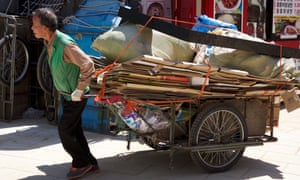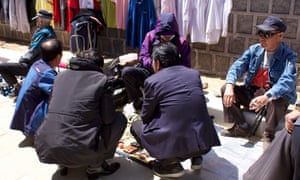South Korea’s inequality paradox: long life, good health and poverty | Inequality
Earlier this year, an international team of scientists made the stunning prediction that women in South Korea born in 2030 can expect to live, on average, until they are 90, taking them past Japan to the summit of the global longevity table.
The study, published in the Lancet, marked the first time average lifespans for men or women anywhere in the world have exceeded nine decades.
South Koreans, it forecast, will experience the biggest rise in life expectancy in the industrialised world, with women adding 6.6 years to their average lifespan by 2030 compared with 2010. The prognosis was similarly encouraging for South Korean men, who will edge ahead of other nations with a life expectancy of 84.
The findings underlined South Korea’s emergence from the ashes of the 1950-53 Korean war and its transformation into a successful exporter of everything from consumer electronics and smartphones to kimchi and K-Pop.
But the report also exposed a paradox. While South Korea’s soaring rise in life expectancy is expected to continue, almost half of its citizens aged over 65 now live in relative poverty, according to OECD data.
The survey found that 48.6% of South Korea’s elderly were in poverty (defined as earning 50% or less of median household income) in 2011, the highest level among the 34 OECD countries.

About a quarter of them live alone, and high levels of isolation and depression have led to a dramatic rise in elderly suicide, from 34 per 100,000 people in 2000 to 72 in 2010. Anecdotal evidence suggests many decide to take their own lives to avoid becoming a burden to their families.
“Life expectancy here has grown faster than in any other country in the world,†says Shin Kwang-yeong, a professor of sociology at Chung-Ang University in Seoul. “But the speed of ageing has been so fast that the majority of elderly people here now live in relative poverty.â€
No savings and no family support
At Tapgol Park in Seoul, dozens of people form a line to receive free lunches at a facility run by a Buddhist temple. Above the entrance is a sign that reads: “You are our hope.â€
The cafeteria, which is open all year round, used to serve about 140 people a day, but the number has risen recently to more than 200, says Kang So-yoon, a volunteer.
“The main reason is because the economy is in bad shape and older people are struggling to find work,†she says. “For some, this is the only meal they will have all day. If they don’t have children to look after them, we are all they have. They’d have to beg on the street otherwise.â€

Ironically, part of the reason for their plight may be the cost of supporting their own offspring. “While they were still working,†says Shin, “many elderly people were unable to put aside enough savings for later in life because they spent too much on their children’s education.â€
A woman in her late 70s says she can’t afford to feed herself on her pension. “I come here for free meals,†says the woman, who declines to give her name. “My children can’t help me because they are struggling financially themselves. I don’t want much, but a bit more money every month would be a great help.â€
The traditional expectation that children will perform their filial duty and look after their parents in old age has stifled the emergence of a welfare state able to cope with South Korea’s rapidly ageing society, according to Shin.
“Traditionally, observance of Confucian ethics meant it was taken for granted that children would look after their elderly parents,†he explains. “But the family unit has undergone a tremendous transformation. Far fewer old people in South Korea live with their married children than in, say, Japan. And the increasing polarisation of South Korean society means it is getting harder for adult children to support their parents financially.â€
Outside the cafe, the neighbourhood’s auxiliary “silver†economy is in full flow, with cheap second-hand watches, jewellery and clothes laid out on the pavement encircling the park. Every now and then, an old man or woman passes by pulling rickety wooden handcarts loaded with piles of collected cardboard and paper they can sell for a few thousand won a day.
Among the park’s regular visitors is Kim Jin-yang, a 72-year-old who fought in the Vietnam war, receives a veteran’s payment on top of his basic pension and has developed health problems caused by exposure to Agent Orange.
“I served my country, yet I got next to nothing from the government,†says Kim, who worked in logistics alongside American troops. “But I have adjusted my lifestyle according to my means, and I can just about get by.â€
Affordable universal healthcare
The financial plight of older South Koreans emerged as a key issue in May’s presidential election, which was won by the left-leaning former human rights lawyer, Moon Jae-in.
Moon, whose victory was due in part to public anger over the rising income gap and record youth unemployment under his conservative predecessor, Park Geun-hye, has made welfare reform a priority.
He has pledged to raise the basic pension from just over 200,000 won (138 GBP) to 300,000 won per month, and to double the number of job openings for older workers to 800,000, coupled with significant monthly wage increases. He also plans to subsidise the treatment of Alzheimer’s and other forms of dementia, make more money available for caregivers, and increase social housing provision for elderly people.
Like Japan, South Korea is expected to undergo rapid demographic change in the coming decades â€" with the proportion of over-65s predicted to increase dramatically to 40% of the population by 2060, compared to 13% today, according to Statistics Korea.
“Over the last 20 years, the rate of increase of life expectancy in South Korea has been very steep, with no indication of slowing down; hence the high levels projected in 2030,†says Dr Vasilis Kontis, the longevity study’s lead author.
Kontis, from the School of Public Health at Imperial College London, agrees there is an “apparent contradiction†between the country’s pre-eminent life expectancy projections, and its relative poverty data.

“This apparent contradiction can be explained to a large degree by the fact that South Korea has one of the highest rated universal healthcare systems in the world, which includes care programmes for the elderly,†Kontis says.
“But there are also lifestyle factors that have contributed to high life expectancy in South Korea. Those over 65 years old today belong to a generation with very low obesity prevalence â€" one of the lowest worldwide â€" and low levels of smoking. These are two predominant factors behind the low cardiovascular disease rates in this age group, which are lower than in western countries with high life expectancy levels, such as Switzerland, Australia and New Zealand.â€
Certainly, South Korean citizens have not benefitted equally from decades of economic development. But comprehensive and affordable healthcare has enabled older people to remain healthy, even on comparatively low pensions, according to Yang Jae-jin, a professor of public administration at Yonsei University in Seoul.
“The elderly poverty rate in South Korea is not absolute poverty,†says Yang. “It refers to relative poverty, or below 50% of the median income. That’s why it is possible for poor elderly people to live longer, even though they are in relative poverty. In addition, healthcare is universal and treatment for the poor is paid for by the state.â€
Could South Korea’s astonishing longevity statistics come under threat? Kontis does not rule out negative impact on life expectancy, particularly if the country is hit by economic crises and fails to find a long-term solution to hardship among older people.
“There is no justice or fairness in modern South Korean society,†says Kim, the war veteran who is drawn to Tapgol Park not just by the promise of a free meal, but also by the sense of camaraderie he once enjoyed in the military. “Most people don’t care about their fellow citizens any more. This country has stopped functioning.â€

0 Response to "South Korea’s inequality paradox: long life, good health and poverty | Inequality"
Posting Komentar